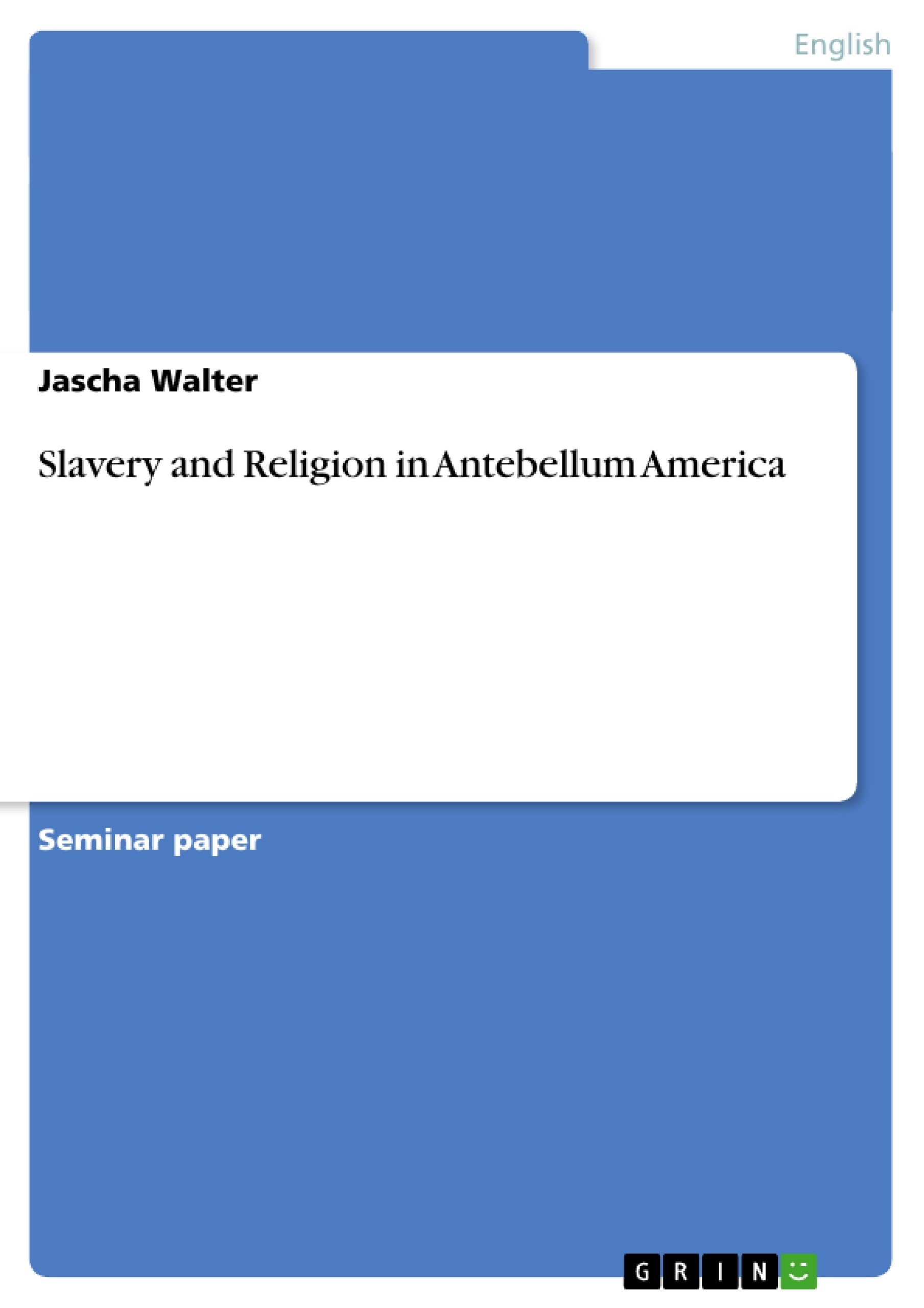My original plan, to compare the northern and southern states of antebellum America with regard to the influence of religion on the attitude to slavery, proved to be problematic, because of the difficulties connected with getting information about the local residences of the different denominations. I found a lot of information about several aspects dealing with connections between religion and slavery, and thus I concentrated on the other aspect of the title, which were southern proslavery argumentations. As far as the idea of comparison is concerned, I collected information about the different denominations of antebellum America and their contribution to abolition or their indifference and inability to take a stand against slavery. To find relevant secondary literature I searched the university library Magdeburg, the university library Hamburg and the digital library of the “Making of America” website. I also found secondary literature in the internet through a search via the search engine www.google.de.
First I want to present the different churches and denominations of antebellum America and their attitude to slavery. In most cases a development in the attitude can be observed. The second part of this essay concentrates on religiously oriented proslavery argumentations and is separated in different approaches and biblical aspects. The final topic deals with the conversion of slaves, which I found interesting, too, but I decided to mention this aspect only to some extent, because the centre of attention was supposed to be the attitude to slavery in connection to religion. Since I found more information than I initially had expected, I found myself compelled to make more footnotes, than I would have preferred to do. Since this is caused by the wealth of information, I ask to be excused for this.
Inhaltsverzeichnis (Table of Contents)
- Introduction
- The Different Churches and their Attitude to Slavery
- Churches and Slavery in General
- The Protestant Episcopal Church
- The Methodist Episcopal Church
- The Presbyterian Church
- Congregationalists
- Baptists
- The Society of Friends / Quakers
- Other Denominations
- Religious Proslavery Argumentations
- Southerners' Self-Assessment and the Justification of Slavery
- Noah's Curse on Ham and his Son Canaan
- Jesus and Slavery
- Comparisons between Slavery in the Bible and in America
- The Terms "Slave" and "Servant" in the Bible
- Aspects of the Conversion of Slaves
- Conclusion
Zielsetzung und Themenschwerpunkte (Objectives and Key Themes)
This essay aims to analyze the influence of religion on the attitude towards slavery in antebellum America, with a particular focus on the southern states and their proslavery arguments. It examines the different churches and their stance on slavery, exploring their development and evolution over time.
- The role of Christian churches in shaping attitudes towards slavery in antebellum America.
- The development of proslavery arguments within various denominations.
- The influence of biblical interpretations on the justification of slavery.
- The complexities of the churches' response to the abolition movement and their struggle to reconcile their faith with the practice of slavery.
- The process of slave conversion and its impact on religious discourse.
Zusammenfassung der Kapitel (Chapter Summaries)
The essay begins with an introduction that outlines the research process and explains the focus on southern proslavery arguments due to the limited availability of information about local church residences. The introduction also introduces the main sections of the essay.
The first chapter delves into the different churches and their attitudes towards slavery, highlighting their evolution and the challenges they faced in reconciling their beliefs with the practice of slavery. The chapter examines key denominations such as the Protestant Episcopal Church, the Methodist Episcopal Church, the Presbyterian Church, and others, analyzing their positions and actions regarding slavery.
The second chapter explores the religious justifications for slavery, focusing on arguments drawn from biblical interpretations and southern self-assessments. It examines specific biblical passages, such as the curse of Ham and the use of the terms "slave" and "servant," to understand how religion was used to legitimize the institution of slavery.
The third chapter briefly touches upon the topic of slave conversion, highlighting its significance in the broader discussion of slavery and religion. This section underscores the complex interplay between religion, social structures, and the lived experiences of enslaved people.
Schlüsselwörter (Keywords)
The key terms and focus topics of this work include slavery, religion, antebellum America, proslavery arguments, churches, denominations, biblical interpretations, conversion, and abolitionism. The essay explores the influence of religious beliefs and practices on the complex social and political context of the antebellum South.
Frequently Asked Questions
What is the focus of this essay on slavery and religion?
The essay analyzes how religious denominations in Antebellum America influenced attitudes toward slavery, focusing on Southern proslavery arguments.
Which churches' attitudes are examined?
The study examines the Protestant Episcopal, Methodist Episcopal, Presbyterian, Baptist, and Quaker (Society of Friends) churches.
What were common religious justifications for slavery?
Southern arguments often relied on biblical interpretations, such as Noah's curse on Ham/Canaan and the use of the terms "slave" and "servant" in the Bible.
Did any denominations support abolition?
The essay notes the contribution of certain groups, like the Quakers, to the abolition movement, while others struggled with indifference or internal division.
Is the conversion of slaves discussed?
Yes, the essay touches upon the conversion of slaves as an interesting aspect of the complex relationship between slavery and religious practice.
- Quote paper
- Jascha Walter (Author), 2004, Slavery and Religion in Antebellum America, Munich, GRIN Verlag, https://www.hausarbeiten.de/document/45623


